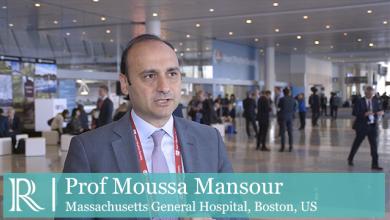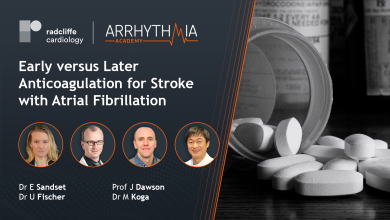Search results
Author(s):
Moussa Mansour
Added:
5 years ago
Prof Moussa Mansour discusses lower adherence direct oral anticoagulants.
Filmed by Radcliffe Cardiology on-site at HRS 2018 in Boston, US.
View more
Joan Antoni Schoenenberger
Author
Felicita Andreotti
Job title: Professor of Cardiovascular Medicine
Author
Author(s):
Else Sandset
,
Jesse Dawson
,
Urs Fischer
,
et al
Added:
9 months ago
Dr Else Sandset (Oslo University Hospital, NO) is joined by Prof Jesse Dawson (University of Glasgow, GB), Dr Urs Fischer (University Hospital Basel, CH) and Dr Masatoshi Koga (National Cerebral and Cardiovascular Center, JP) to discuss the findings from their recent paper on "Early versus Later Anticoagulation for Stroke with Atrial Fibrillation" published in the New England Journal of Medicine…
View more
Author(s):
George D Katritsis
,
Demosthenes G Katritsis
Added:
3 years ago
Atrial fibrillation (AF) is associated with a fivefold increased risk for stroke, a twofold increased risk for dementia, and a tripling of risk for heart failure,1,2,3 while AF genetic risk is strongly associated with cardioembolic stroke.4In the Framingham Heart Study the percentage of strokes attributable to AF increases steeply from 1.5% at 50–59 years of age to 23.5% at 80−89 years of age.5,6…
View more
Author(s):
Philipp Bushoven
,
Sven Linzbach
,
Mate Vamos
,
et al
Added:
3 years ago
Atrial Fibrillation, Cardioversion and Stroke Risk
Atrial fibrillation (AF) is the most common serious chronic heart rhythm disorder with an estimated prevalence in the general population of around 1%.1 The arrhythmia affects about 2.2 million persons in the US and 4.5 million individuals in the EU. Due to the advancing age of the population, the prevalence of AF is likely to increase even…
View more
Author(s):
Andreas Goette
,
Hein Heidbuchel
Added:
3 years ago
AF is the most common sustained cardiac arrhythmia and poses a significant public health challenge.1 In cases of AF, if sinus rhythm does not spontaneously return, cardioversion may be needed to alleviate symptoms and to improve cardiac performance.2 This may be performed by pharmacological methods, i.e. the administration of antiarrhythmic drugs, which is the preferred strategy in recent-onset…
View more
Author(s):
Pascal Vranckx
,
Marco Valgimigli
,
Hein Heidbuchel
Added:
3 years ago
Anticoagulation with vitamin K antagonists (VKAs) has been used for the long-term treatment and prevention of thromboembolic diseases and for stroke prevention in atrial fibrillation (AF) for the past half century. Until the last decade, VKAs were the only oral anticoagulant (OAC) agents available, and warfarin remains the most commonly prescribed OAC worldwide.1 Direct oral anticoagulants (DOACs…
View more
Antoni Martínez-Rubio
Research Area(s) / Expertise:
Author
Author(s):
Brett Wanamaker
,
Thomas Cascino
,
Vallerie V McLaughlin
,
et al
Added:
3 years ago
Pulmonary hypertension (PH) is a chronic condition that is characterised by elevated pulmonary vascular pressures and can be caused by several disease processes (see Table 1).1 Regardless of the aetiology, PH is a progressive disease with a clinical course characterised by frequent decompensations in advanced stages and often a poor prognosis despite the development of novel therapeutic agents.2…
View more


















